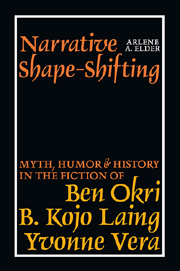 Narrative Shape-Shifting
Narrative Shape-Shifting 2 - B. Kojo Laing's Linguistic Journeying
Published online by Cambridge University Press: 05 April 2013
Summary
[T]ravelling on the travelling earth proved the world belongs to all… (Woman of the Aeroplanes 60)
Critical Discomfort
Of the three writers I discuss in this study, B. Kojo Laing proves the most eclectic, employing elements not only of oral performance but also contemporary literary strategies of linguistic hybridity and typological innovation. Yet, like Ben Okri's fiction, his too is a comic blending of two imaginative and rhetorical sources that, at first glance, seem as far apart as we can conceive, both in terms of form and reception: orature and postmodern fiction. The major difference between the two writers is not that Okri writes of Nigeria and Laing of Ghana, for their general concern about their respective, formerly colonised countries is the same: the hazards of modernism. Humor provides the distinction between their approaches to this common subject. Laing, like Okri, weaves his narratives into the strong, organic web of African oral tradition and demonstrates through his marvelous characters and unexpectedly related geo graphical spaces the necessity of recognising similarities rather than differences. Moreover, his wide gaze, too, scans the world and is not fixed on his nation or continent alone. And like his Nigerian counterpart, Laing is a consummate Trickster, yet he is also consummately literary.
- Type
- Chapter
- Information
- Narrative Shape-ShiftingMyth, Humor and History in the Fiction of Ben Okri, B. Kojo Laing and Yvonne Vera, pp. 56 - 94Publisher: Boydell & BrewerPrint publication year: 2009


